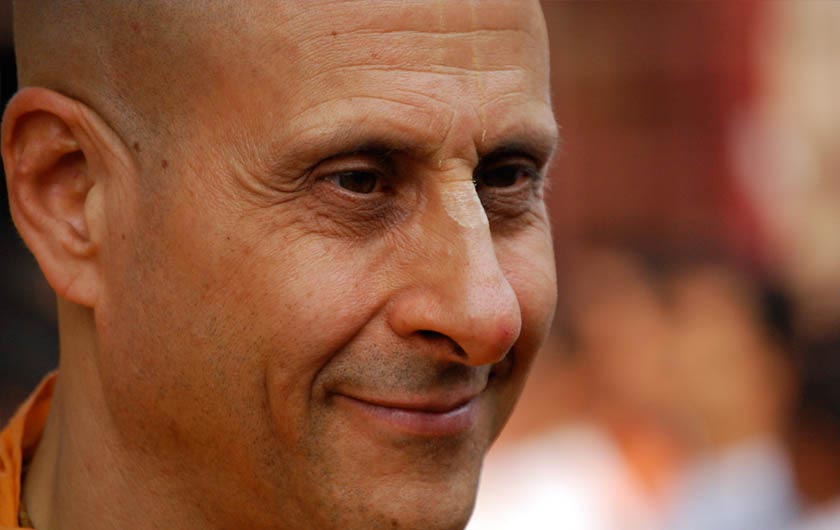
Richard (now Radhanath Swami) soon learnt that one of the most special devotees in Vrindavan was Krishnadas Babaji. Krishnadas Babaji would sing devotional songs with great absorption and often struggled to restrain tears. Although he was seventy years old, he was like an inexhaustible volcano, erupting with ecstasy each time he chanted the Lord’s holy names. Richard learnt that Babaji knew fluent English but never spoke a word of it until it was absolutely required. Richard was particularly impressed by this because he had met many in India who would try to show off even little bit of English they knew. But babaji had no trace of arrogance.
In Krishnadas Babaji’s association, Richard’s misconception that silent meditation is the path of spirituality was shattered. He saw the obvious power of Babaji’s knowledge, detachment and love, and concluded that chanting and dancing is not sentimental but a deep expression of love for the Lord. Babaji spoke with great feeling about Lord Chaitanya Mahaprabhu who descended five hundred years ago and distributed love of God in the easiest possible way.
Radhanath Swami recollects that Krishnadas Babaji was empowered to chant the holy names constantly because he had no trace of pride and sought no adoration. While teaching young Richard (now Radhanath Swami), Babaji revealed the essence of Lord Chaitanya’s philosophy that one should strive to be more humble than a blade of grass, more tolerant than a tree, and to offer all respect to others while expecting none for one’s self. Only in this way one can taste the nectar of the Holy Name.
Humility, sometimes misconstrued as a weakness, is actually a power that few people tap. Radhanath Swami, quoting his guru, says, “Humility means the freedom from the anxiety of having the satisfaction of being honoured by others.” Radhanath Swami also contrasts this by saying that pride, the opposite of humility, makes us crave for honour from others as our source of happiness. When a proud person is disrespected, his lack of freedom becomes appallingly obvious; he is forced by pride to lose his prudence and explode with words and actions, often hurting the other person and even himself far beyond what the situation warrants. Humility, on the contrary, brings freedom from the craving for external honour and empowers us to act for our and everyone’s long-term good. Radhanath Swami’s pearl like wisdom shines forth in his declaration, “Humility doesn’t mean that we let others trample upon us without protesting, but that we don’t let others’ (mis) behaviour determine our decisions and lives. Humility allows us to calmly consider the cause of disrespect and maturely adopt a principled course of action to clarify the situation and rectify the misdemeanour.”
Radhanath Swami gives equal importance to tolerance and considers it to be an underutilized power. A relative behaves unreasonably, a colleague speaks impolitely, a power cut upsets our plans, and another vehicle cuts across our path-such daily situations offer rich premiums for the tolerant. Tolerance empowers us to not let irritating circumstances steal our peace of mind. “Lack of tolerance makes us a victim of our circumstances”, says Radhanath Swami, “whereas tolerance brings the freedom to choose an intelligent response and stay fixed in our values and goals, irrespective of our circumstances.”
Radhanath Swami’s emphasis on humility and tolerance brings to mind an example that one friend gave. Our biceps protect us from physical dangers. Similarly, humility and tolerance protect us from internal over-reactions to externally distasteful situations. Thus they constitute our inner muscles, which we can increase by the spiritual bodybuilding exercise of chanting the holy names of God.
 Table of Contents
Table of Contents

 Founder-acharya of the International Society For Krishna Consciousness (ISKCON)
Founder-acharya of the International Society For Krishna Consciousness (ISKCON) “Go to India” a sweet but commanding voice; spoke up in the heart of young Richard (later Radhanath Swami) who was immersed in meditation, his search for meaning in life has brought him to the Isle of Crete. Today he was ordered to go to India. Born and raised in the middle class suburbs of Chicago, Radhanath swami grew up in the 1950’s and 60’s era when popular musicians protested war, prejudice and social injustice. Radhanath swami would listen to these songs again and again, but their lyrics referring to God stirred his soul. Peter, Paul and Mary- the folk trio from Greenswich village sang in their debut album
“Early in the morning, about the break of day
I ask the Lord, to help me find my way”
This simple prayer was to guide Radhanath swami in the coming years of his life........
“Go to India” a sweet but commanding voice; spoke up in the heart of young Richard (later Radhanath Swami) who was immersed in meditation, his search for meaning in life has brought him to the Isle of Crete. Today he was ordered to go to India. Born and raised in the middle class suburbs of Chicago, Radhanath swami grew up in the 1950’s and 60’s era when popular musicians protested war, prejudice and social injustice. Radhanath swami would listen to these songs again and again, but their lyrics referring to God stirred his soul. Peter, Paul and Mary- the folk trio from Greenswich village sang in their debut album
“Early in the morning, about the break of day
I ask the Lord, to help me find my way”
This simple prayer was to guide Radhanath swami in the coming years of his life........
Tolerance empowers us to not let irritating circumstances steal our peace of mind. Lack of tolerance makes us a victim of our circumstances. – Thank you Radhanath Swami Maharaj for teaching the core aspects of spirituality – tolerance and humility.
View CommentWonderful reminder from Maharajah
View Comment“Humility doesn’t mean that we let others trample upon us without protesting, but that we don’t let others’ (mis) behavior determine our decisions and lives”.
Humility pays us back big times by strengthening our spiritual health.
it seems great strength Humility and Tolerance whi is very lucidly explained by Radhanth Swami… Spirtual Body building seems also very important to build because in our daiy circumstances we need these strenths more often than the physical body building.
View CommentRadhanath swami maharaj constantly stress on the topic Humility and Tolerance in form his lectures.
we should learn to Imbibe from it and try to practice it in our daily life.
As their is a famous saying Once greatness has to be estimated when he tolerates provoking situations
View CommentFew striking points:
-Chanting and dancing is not sentimental but a deep expression of love for the Lord
-Krishnadas Babaji was empowered to chant the holy names constantly because he had no trace of pride and sought no adoration.
-Humility, on the contrary, brings freedom from the craving for external honour and empowers us to act for our and everyone’s long-term good.
Thank you for posting this meditation.
View CommentSpiritual life empowers a person to overcome any situation in a manner that is beneficial to ourselves as well as others.One’s chanting of the Holy name sincerely enables one to develop the attitude of humility and tolerance as exhibited by Maharaj himself.We must be inclined to follow in his footsteps.All glories to Maharaj.
View CommentNice teachings by Radhanath Maharaj
View CommentNow I understand the real value of tolerance.
View Comment“Lack of tolerance makes us a victim of our circumstances”, says Radhanath Swami, “whereas tolerance brings the freedom to choose an intelligent response and stay fixed in our values and goals, irrespective of our circumstances.”
Thank you swami ji
Very nice article – Thanks a lot Maharaj for bringing out the importance of Humility and Tolerance so nicely.
View CommentVery beautiful. Thanks to Radhanath swami for stressing these two points – humility and tolerance.
View Commentthe essential point to be humble means have no desire to be appreciated by others and when one remains humble for him chanting holy names constantly is possible
View CommentThe lesson of Humility first learnt, practiced and then preached by Radhanath Swami Maharaj
View CommentPAMHO. Thanks RNSM for this wonderful lesson.
View CommentAmazing!
View CommentI would really like to develop these biceps with the blessings of a saintly person like Radhanath Swami
View Commentthank u radhanath swami maharaj
View CommentIf we understand Swamiji’s statement, we will see God’s hand in everything, and thus achieve God Consciousness.
View CommentThank u Radhanath Swami for teaching us to see each & every situation of our life as a mercy of Lord & accept every moment with positive attitude.
View CommentHare krsna dandavat pranam
View Commentthank you Radhanath Swami for so wonderfully explaining about every aspect of life as part of purification of our heart.
View Commentthank u radhanath swami maharaj
View CommentHare krsna Dandavat pranam
View CommentSimply wonderful.Thank you Maharaj for bringing out such vital lessons of Humility & Tolerance.All glories to Radhanath Maharaj!
View Commenthumility and tolerance protect us from internal over-reactions to externally distasteful situations. Thus they constitute our inner muscles, which we can increase by the spiritual bodybuilding exercise of chanting the holy names of God
View Commentit is truly said by Radhanath Swami Maharaj that Humility means the freedom from the anxiety of having the satisfaction of being honoured by others.
View Comment